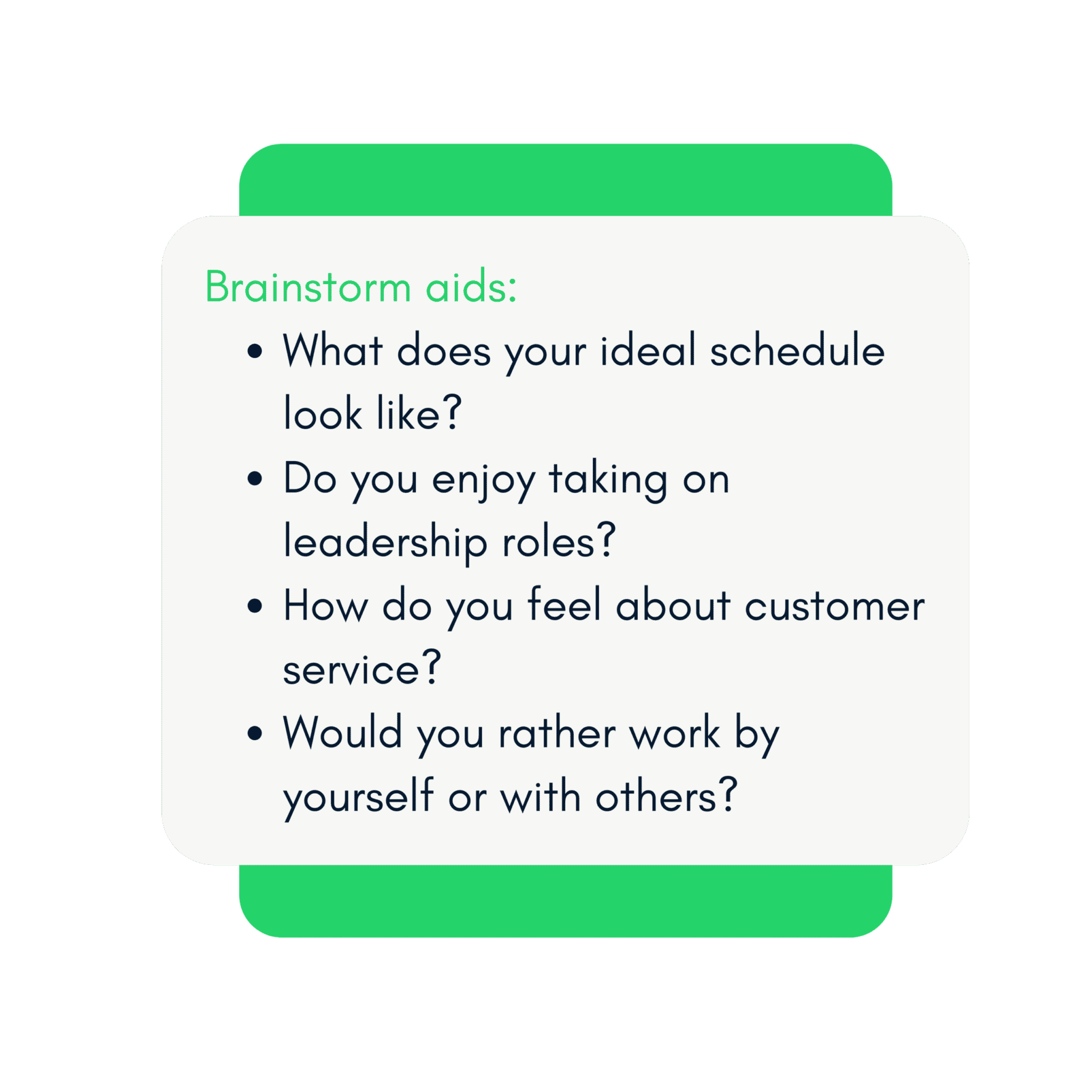Changing careers is seldom a straightforward process. In this article, we will discuss how to make a career change by reflecting on your job history, transferable job skills, lifestyle factors, and personal finances. Read on to learn how to initiate a successful career change.
When to consider switching careers?
Are you feeling stressed, drained, or otherwise dissatisfied at work? Do you find yourself thinking I need a new career or I need a career change? There are lots of steps to take as you pursue a new career path and it can feel overwhelming to navigate this transition into a new field alone. In this article, we will discuss 10 important steps for changing careers.
How to change careers: 10-step guide to finding a new career
Wondering how to start a new career? A change of career path can feel overwhelming, especially since knowing how to switch careers is rare. Everyone has a unique employment history and skill set. Many of these job skills are likely transferable. This is why it’s important to reflect on past jobs when you are trying to figure out how to switch careers and continue to grow, personally and professionally.
01
Reflect on past jobs
Make a list of your past jobs. What did you like about each position? What did you dislike? Do your best to be honest, and remain uncensored. Write everything down — good and bad — so you can try to identify patterns and trends.
Here are some questions to help you brainstorm for career change ideas ➡️
Consider each of these questions thoughtfully. And remember, knowing what you don’t like is just as important as knowing what you do like when considering new career ideas.

02
Identify transferable job skills
It’s important not to feel stuck in a career, because chances are, there are alternative careers that use similar job skills. Changing careers can feel more manageable if you focus on your transferable skills. Make a list of things you’re good at and enjoy doing at work. Some possible skill sets include customer service, writing, leadership, research, organization, planning, and marketing. Of course, there are many more! Identifying transferable job skills will also help you reflect on new skills you want to develop.
03
Do research
Now that you have a better idea of what you like, dislike, and are good at, it’s time to start researching alternative career paths! The best way to start thinking about how to find a new career is to search the internet and ask friends, family, and acquaintances questions about their careers, job satisfaction, and the job market. Consider taking a career test can be a valuable tool for job seekers. There are lots to choose from online.
04
Consider lifestyle factors
There are lots of factors to consider when starting a new career. It’s important to reflect on the effect your new job would have on your lifestyle. For instance, are you willing to move for your career? Maybe the idea of moving excites you. Or maybe you are surrounded by friends and family where you are and are hesitant to move. How do you anticipate a new career will affect your mental health? Will you be able to achieve a healthy work-life balance? Another important factor to consider is whether you have the money, time, and patience to go back to school.
05
Reflect on your finances
What do your finances look like? Can you afford to change careers right now? If the answer is no, don’t feel discouraged. Take methodical steps towards your goal. It’s important to remain grounded and realistic during life transitions. Do you have debt? Are you dependent on your current job for your healthcare? How much are your monthly bills? Based on your savings, how much time can you afford to devote to a job search? Can you afford to go back to school?

College Financial Planning – An Overview
Regardless of whether you attend a state school or a private school, college is expensive Click here to read more
06
Make a budget
If you decide that now is the time to switch careers, make a budget for yourself. This is an important bit of career advice. Personal finances are particularly important during times of transition. Brainstorm ways to minimize your bills. Reflect on your personal spending habits honestly and thoroughly. How much do you spend recreationally? How can you start practicing moderate spending?
07
Consider supplemental income
If you don’t have the savings to commit to a job search right now, consider sources of supplemental income. Consider taking a temporary or part-time job to help cover your bills as you take steps towards switching careers. Changing jobs can feel intimidating for lots of reasons, but it’s important when you are switching careers to make sure you are realistic about your finances.
08
Update your resume
As you start taking steps towards switching careers, you’ll have to update your resume and LinkedIn account. Make sure everything is up-to-date, polished, grammatically correct, and professional. Have several people proofread it on your behalf. Highlight transferable job skills and tailor your resume for your new career.
If there are aspects of your previous jobs that you’ve consistently disliked, it’s okay to remove them from your resume. For example, if you have experience working with children but want to move away from this kind of work, it’s okay to remove childcare from your resume.

Recruiters and hiring managers often look at your social media as well, so make sure your online presence is professional as you move forward with your job applications and your career move.
09
Seek out resources
Once you have a good idea of what career you’d like to pursue, and have reflected on your finances and lifestyle factors, it’s time to start diving deeper into your research. What else do you want or need to know about your career before moving forward?
Consider reaching out to professionals in your prospective field. Email them questions or ask if they would be open to an informational interview. An informational interview is a meeting where you sit down with a professional and ask them questions about their field and how they got to where they are now professionally. You might also want to seek out job shadowing opportunities or hire a career coach.
10
Network
Networking is a crucial aspect of any successful career, but it is particularly important if you are trying to change careers. Without direct industry-related experience, a personal referral is your best method for achieving recognition. Having someone vouch for you personally is a great way to get your foot in the door and receive an interview.
Looking for a new career and still not sure what to decide? Contact us
If you are feeling overwhelmed, know that you are not alone. Lots of people consider changing careers. If you are seriously considering a change of career, reach out to learn more about our services and how we can help you find a new fulfilling career.
Final points on career switching
There are lots of additional resources to consider as you start thinking about changing careers. Brush up on your interview skills. Learn how to write a resume for changing careers. Actively reflect on your employment history and job skills. Reach out to professionals in your prospective field and ask them for advice and career-specific insights.
FAQs related to starting a new career
Still intimidated by changing careers? Read on for answers to some frequently asked questions about starting a new career.
Is changing careers a good idea?
There are lots of reasons for you to change your career and all of them are valid. You deserve to feel fulfilled by your career! Perhaps you don’t feel like you are being challenged at your current job and there are limited opportunities for professional growth. Perhaps your job isn’t what you expected or you are feeling dissatisfied or burnt out. While changing careers can feel nerve-wracking, as long as you can gather the necessary momentum, it may very well be time to take that leap of faith!
How do I switch careers with no experience?
Do your best to focus on transferable job skills. You may not have any direct industry experience, but that doesn’t necessarily mean you aren’t capable or qualified. There may be an overlap between past jobs and your new future job. Learn how to properly market yourself by practicing mock interviews, anticipating possible interview questions, and researching how to prepare a cover letter for transitioning careers. Networking is also invaluable when contemplating how to change careers. Seek out networking events in your area.
Is it worth changing careers at 45?
Changing careers at 45 may seem overwhelming, but it’s never too late to start thinking about switching careers! What’s more, you still have many professional years left at age 45 and plenty of time for another career. Many aspects of our lives are influenced by our careers, including our sense of stability, schedules, health, happiness, and overall sense of purpose and fulfillment. If you can improve your life in some way, you owe it to yourself to start thinking seriously about switching careers. Don’t wait! Start brainstorming ideas for new careers at 45.
What is the best career to retrain for?
This question varies greatly from person to person. Reflect on your past jobs, educational background, and existing job skills. Are you willing and able to go back to school, take classes, or earn certificates? There is no wrong or right answer, but your answer will influence which careers will be accessible to you.
How many times does the average person change careers?
It is thought that the average person will have 12 jobs in their life. Younger workers tend to change jobs with a fair amount of regularity. As workers get older, statistically they are less likely to change careers, at least with as much frequency. It is, however, still common to change careers regardless of one’s age. In fact, the average career change takes place when workers are mid-career, around 39 years old. Rest assured, many professionals are reflecting on career change at 35 ideas.
How do I get a job when changing careers?
Changing careers can take some research and forethought. Applicants with personal referrals are much more likely to land an interview. This is why networking is an important strategy to focus on when switching careers. It is also important to reach out to professionals in your prospective field and ask them for questions and advice on your specific field. Each career is different, but with research, initiative, and perseverance, you are more likely to receive a job offer when changing careers.
Why am I scared of changing careers?
It’s perfectly normal to feel hesitant or scared to change careers. Jobs offer us security and stability. Oftentimes, they offer us a sense of identity. It can be scary to make big life changes. Also, there is no one way to change careers. Therefore, the process can seem overwhelming. Hopefully, though, with the 10 steps outlined above, you will feel inspired to take initiative and start thinking about your career goals, next career, and ultimately your dream job.
Subscribe to our blog
Don’t miss out on the latest college admissions trends, updates, and tips!



